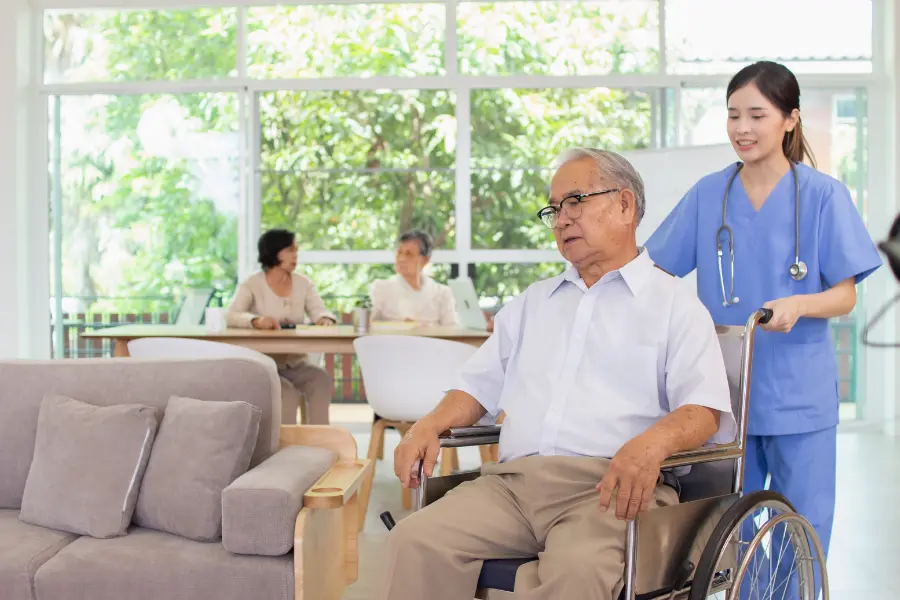Bellmore, NY is famous for its drifting snowstorms and snow-covered mountains. Along with this winter lovelies come the bone-chilling, tooth-rattling winds from the Atlantic. Apart from the frostbite symptoms, the elderly are always at risk of obtaining, family get-togethers can be often dangerous. While trying to enjoy family time, seniors face the horrible reality of falling ill. Elders are already more likely to suffer from chronic conditions, and weaker hands and limbs make action or movement challenging.
In the long run, the simple, not so life-threatening activities turn into life-altering processes. This guide aims to assist older adults with their family members in addressing the myriad of outdoor as well as indoor ailments slip and fall risks and winter shivering presents.
Why Winter Can Be Risky for Seniors in Bellmore
Heavy snow and freezing weather are the crown jewels of winter and proudly strut their stuff in Bellmore from December to March. This shifts quite a few people’s favorite season to a quite straining reality that makes receiving medical assistance on your own a Herculean task.
Concern Factors include: Greater Chance of Falling: Limited visibility, snow, and ice can be problematic for older adults and their mobility outdoors.
Cold Sensitivity: Difficulty managing body heat, especially in the elderly, is a common chronic issue coupled with other unresolved problems.
Reduced Immune Response: Slower response to common illnesses in older age such as pneumonia and the flu, weakens the immune system.
Social Isolation: Increased depressive symptoms and reduced mental health stem from isolating elderly individuals from peers due to harsh weather conditions and icy roads.
Slower Brownout Response: Noticeable delay in responding to emergencies like snowstorms and power outages.
Before going to my top 10 safety tips for seniors from Bellmore, first, understand these above deeper concerns.
Top 10 Winter Safety Tips for Seniors
Suggestions in this section are to assist the elderly population, whether they reside with family, alone, or under professional supervision.
Preventing Slips and Falls
- Snow should be removed and mats placed at frequently used entrances to reduce slips and falls.
- Mats should also be placed at toilet doorways.
- Toilet areas should not have mats to eliminate the risk of falls.
Being alert and proactive can help mitigate the chances of injuries, even the small ones.
Keep the Home Warm and Safe
The elderly are at a greater risk of indoor cold temperatures that can lead to severe hypothermia.

Persuading warmth instead of cold can be accomplished with options like:
- Setting the thermostat to ensure no lower than 20°C.
- Keeping doors and windows tightly closed to eliminate gusts and draughts.
- Insulated curtains alongside weather stripping need to be used.
- Space heaters not designed to shut off automatically should be avoided.
- Annual safety and efficiency checks strengthen the system as well.
Dress in Layers and Proper Winter Gear
Appropriate outdoor apparel for the elderly includes:
- Thermal long johns and wool socks.
- Waterproof overgarments and insulating sweaters.
- Warm boots, scarves, hats, and gloves.
For indoors, warm stacked clothes and blankets help cut down heating expenses.
Stay Hydrated and Eat Well
Eating and drinking often take a backseat to our schedules during winter time. Dry air combined with central heating can be dehydrating and can lead to dizziness and even a tumble once in a while.
- Drinking herbal teas and water helps hydrate the body.
- Reducing alcohol and coffee intake helps as both act as diuretics.
- Nourishing the body with hot soups and stews helps provide warmth and nourishment.
- Vitamin C, D, and zinc help strengthen the immune system.
- Providing quick meals during power outages or snowstorms is helpful.
Making winter easier and staying physically recharged is simple with the right foods. Having proper nutrition aids the body’s defence fortifications, which makes staying healthy significantly easier.
Avoid Driving in Dangerous Weather
Driving will always be difficult for older adults with slower reflexes and vision concerns.
Options and measures to mitigate risk:
- Stop running personal errands until the storm or icy conditions have cleared.
- Family caregivers can assist with elderly mobility needs.
- Use purpose-built senior transportation or taxis for ease of access.
- Vehicles must be stocked with emergency supplies such as blankets, water, snacks, flashlights, phone chargers, and others.
If travel is necessary, move at a snail’s pace, exercising extreme caution. It is always advisable to have another person accompany you outside the house during storms.
Emergency Kit Essentials
Winter storms can snap trees, causing power outages which severely muddle a region’s ability to respond to emergencies. An on standby emergency supply kit is always handy.
The following items are easy to use and helpful for the elderly:
- Flashlight with Batteries
- Extra warm clothing (in Layers)
- Medication for Chronic Conditions (minimum 1 week supply)
- Water (1 gallon per person, per day)
- Snacks that do not expire
- First Aid Supplies
- Radio that works on batteries
- Emergency contacts saved on the device
Best practice suggests keeping kits readily accessible instead of attics or basements.
Watch for Signs of Hypothermia or Frostbite
Both can take place without the victim’s knowledge and can worsen gradually and silently. A common misconception of hypothermia is that it can solely happen outdoors over extended periods of time.
A few signs of frostbite are:
- Not being able to feel the fingers or toes
- Gaining or losing weight suddenly
- The shoulder thermostat for the body gets colder
- Collapsing after too much body heat loss
Freezing signs include:
- Painful, but tight
- Lower pain tolerance or painful sensitivity
- Arthritis in the hands
In addition to routine checks with a physician, these areas require vigilant monitoring, limited movement tailored to exercise, and a multidisciplinary approach with therapy within the bounds of the restrictions.
Monitor Medications Affected by Cold Weather
Some specialists who work in orthopedic clinics may be able to treat cold hypersensitivity or hyposensitivity conditions, and some do not have the resources to treat such conditions.
- You could also use a light blanket and then go for a walk or change.
- Create primary uniform and plan columns for modification for midday and afternoon shifts
- Swap morning shift without a time limit for the afternoon shift
Pre-set reminders and alerts can improve effectiveness with the use of a weekly pill organizer.
Combat Loneliness and Isolation
Elderly individuals, particularly newer widows or those with mobility difficulties, are more vulnerable to loneliness and social isolation during winter months as a result of reduced physical and social activities.
Consider the following options to maintain social connections:
- Schedule recurring family phone and video calls.
- Join support groups and book clubs that meet virtually.
- Arrange tea and chat sessions with caregivers and neighbours.
- Employ companion caregivers from reliable home care agencies.
- Looking after your mental health is just as important as your physical health.
Hire a Professional Home Caregiver
In-home caregivers greatly assist with home care safety concerns. They can:
- Supervise medication, diet, mobility, grooming, and other hygiene processes.
- Supervise the person and the surrounding area for any safety issues.
- Help with snow-related emergencies.
- Provide basic emotional support and companionship.
- Complete small tasks and help clear snow from pathways and drives.
- One of the biggest advantages of in-home care services is the relief both the elderly and their families get.
Final Thoughts
Specific warm strategies have been discussed in this article for seniors residing in Bellmore to address their winter-related challenges. With these strategies, seniors should be able to navigate the season with more peace of mind. For family members and caregivers who need more assistance during winter, support can be accessed through Precious Pearls Home Care. Our passionate caregivers offer essential supportive services on Long Island during the harsh winter months to help seniors maintain their independence.
Contact us now so we can provide your family with a free consultation on how to keep your loved ones warm, connected, and cherished all through winter.
FAQs
Elderly people are at risk living indoors at temperatures below twenty degrees Celsius. They are advised to sit away from chilly draughts and snugly close to warm window spots. Seniors are encouraged to keep their home’s temperature above this level.
Online lectures, reading, gentle stretching, yoga, and even puzzles are wonderful and mentally as well as physically stimulating activities.
The elderly can get in touch and be taken care of through: daily positive texts messaged by a professional caregiver, frequent phone and video connections, and check-ups given by a neighbor in real life.





